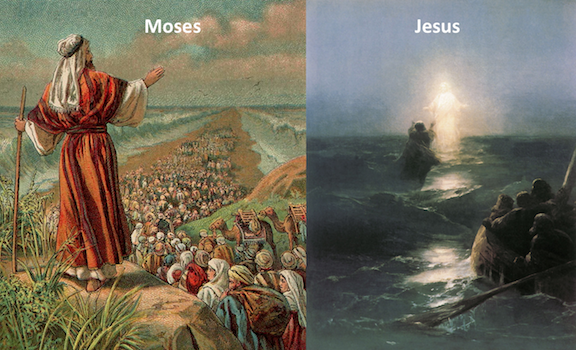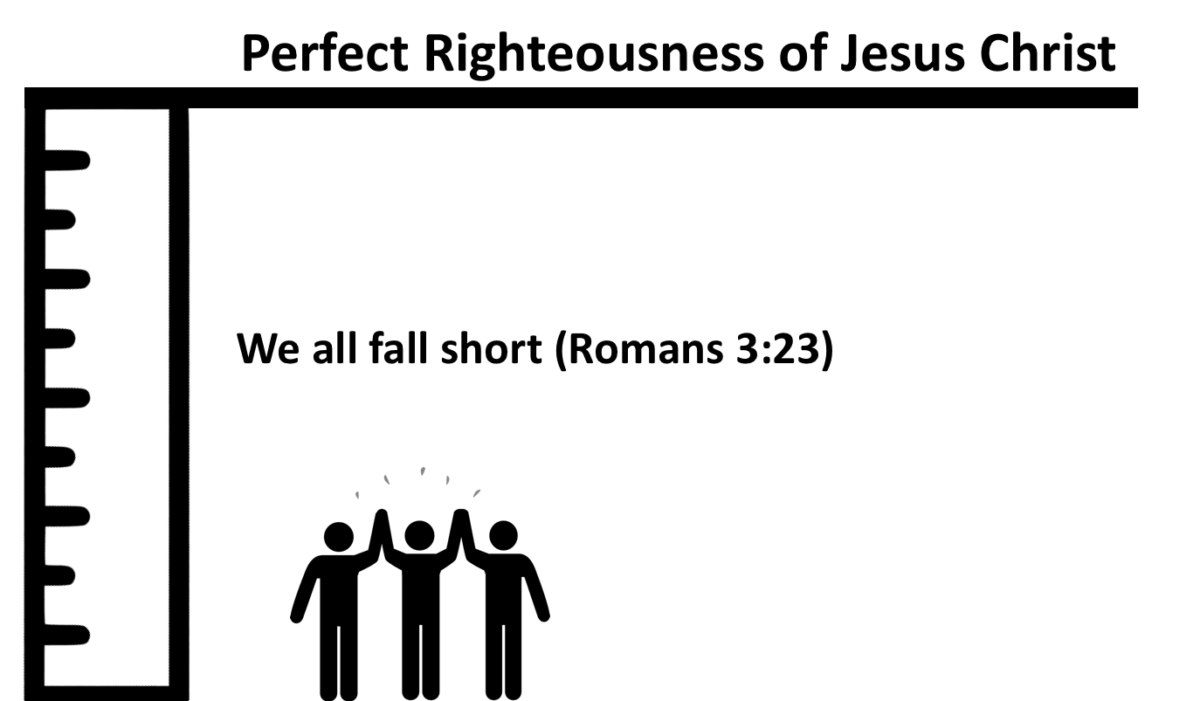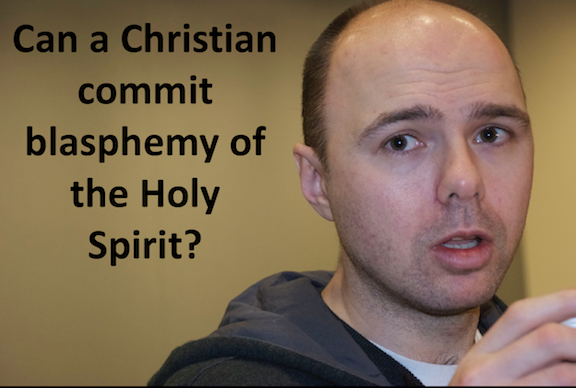In this article we are going to compare the five points of Calvinism with what the Bible teaches to see if it is biblical. We will conclude each section with a question.
Point #1 – Total depravity: Calvinism teaches that all people are totally depraved and “dead” (unable to believe in Christ) in their sins (Ephes. 2:1; cf. John 6:44, 65; Romans 3:9-12; 5:12-14; 8:7-8; I Cor. 1:18, 21; 2:14) and therefore, must be regenerated by God first before they respond in faith to the gospel. The Bible agrees with Calvinism that all people descend from Adam and are guilty of sin (Rom. 5:12-21; 3:23), which argues for man’s lost condition and the universal need for eternal life. Hence, the gospel message is intended for the whole world of mankind. Contrary to Calvinism, which teaches that faith is a gift which logically follows the regeneration of the elect, the Bible teaches that faith is a human response which is the only condition for regeneration (Gospel of John, Acts 16:31; Rom. 4:5; Gal. 2:16; Eph. 2:8-9; et. al.).
Man still retains the image of God in his being which carries with it the ability to believe the gospel for salvation otherwise why would God condemn people for not believing if they have no capacity to believe (John 3:18)? God’s justice would be called into question if a man is held responsible for something he has no capability of doing. Believing in Christ is a person’s responsibility (John 3:18; I John 3:23), so he or she must have the ability to receive eternal life on that basis; otherwise the gospel offer to any and all who believe would be a hoax (Mark 16:15; John 3:15-16; 4:10, 14, 6:35-40, 47; Rom. 10:13-15; I Tim. 2:3-6). The Holy Spirit regenerates people as they believe in Christ (Eph. 1:13-14; Titus 3:5). Saving faith is not meritorious nor a gift from God, but is the conviction that Christ died for our sins and rose from the dead, and then believing or trusting in Christ alone for everlasting life (John 11:25-27; I Cor. 15:3-4; Eph. 2:8-9; Heb. 11:1). Question: If all people possess the image of God (Gen. 1:26 – which includes the ability to think logically, appreciate beauty, have self-awareness, speak in language, and even believe something), why can’t they believe the gospel?
Point #2 – Unconditional election: Calvinism teaches that God unconditionally chose some to be saved in eternity past. This select group will ultimately be saved for all of eternity and will persevere in faith and holiness until the end of their lives (Matt. 24:13). But Calvinism fails to realize that the Bible teaches that election relates to service, suffering, and holiness for the Lord, not to salvation. For example:
1. The Old and New Testaments both make it clear that the Jews are God’s chosen people and the elect (Deut. 7:6; 14:2; 1 Kgs. 3:8; Ps. 33:12; 106:5; Isa. 43:10; 45:4; 65:9, 22; Matt. 24:22, 31; Mark 13:20; Luke 18:7; Rom. 9:11; 11:28; 2 Tim. 2:10; 1 Pet. 2:4). They were chosen to be the line through which Messiah came. Israel was chosen to serve God in its practices and in its worship. Indeed, God has not given up on Israel. By the end of the Tribulation, Israel will cry out to the Lord Jesus and will be delivered. During the Millennium, and then on the new earth, Israel will serve God forever in its practices and praise. Due to the bias toward the Calvinist understanding of who the elect are, many of the references to Israel as the elect in the New Testament are misunderstood. If the New Testament follows and is built upon the Old Testament, then it should not be surprising that both testaments refer to Israel as God’s chosen, His elect.
2. Jesus, God’s Chosen Messiah (Isa. 42:1-4; 49:7; Matt. 12:18; Luke 9:35; 23:35; John 1:34). He was chosen by God the Father to be the Messiah and to die on the cross for our sins (Matt. 12:18; 1 Pet. 2:4).
3. Twelve Men Chosen As Christ’s Apostles. Jesus chose twelve men to be His disciples and apostles (Luke 6:13; John 6:70; 13:18; 15:16, 19; Acts 1:2). The fact that Judas was chosen by Christ demonstrates that this election was to service (John 15:16), not salvation, since Judas never believed in Jesus (cf. John 6:64, 70-71; 13:10-11; 17:12). When Judas, betrayed Jesus, his place was taken by another man chosen by God, Matthias (Acts 1:24-26). One Greek word used for choosing was used of the election of the twelve: eklegomai (Luke 6:13; 15:16,19).
4. Saul Chosen As Apostle to the Gentiles. Saul of Tarsus was later chosen by God to be an apostle as well, specifically the apostle to the Gentiles (Acts 9:15 [ekloge]; 13:2 [prokaleo]; 22:14-15 [procheirizo]).
5. Peter Chosen to take the Gospel to Cornelius. Peter was chosen by God to be the one to take the gospel to Cornelius and his household, the first group of Gentile converts (Acts 15:7 [eklegomai]).
6. God’s Chosen deliverer, Moses. God chose Moses to lead His people out of Egypt and to the Promised Land (Num. 16:5-6).
7. God’s Chosen priestly line, Levi. God chose Aaron and the tribe of Levi to be the priestly line (Num. 17:5; 1 Sam. 2:28; 2 Chron. 29:11). God chose that priests from the tribe of Levi would minister before Him in the temple and would be paid by the tithes of the people (Deut. 18:58; 21:5; 1 Chron. 15:2).
8. Men Chosen to Be in Messiah’s line. Specifically God chose Abraham (Neh. 9:7), Isaac, Jacob (Ps. 135:4; Isa. 41:8; Ezek. 20:5), and Judah (1 Chron. 28:4; Ps. 78:67) to be in the line of Messiah.
9. David Chosen to replace Saul as king. God chose David to replace King Saul and to be in the line of Messiah (2 Sam. 6:21; 1 Kings 8:16; 1 Chron. 28:4; 2 Chron. 6:6; Ps. 89:3).
10. God Chose Solomon to succeed David as king. God chose Solomon over David’s other sons to be king (1 Chron. 29:1).
11. God Chose Mary and Joseph. God’s choosing went right down to Mary, the mother of Jesus (Luke 1:30, 42-45, 48), and Joseph, the husband of Mary (Matt. 1:20).
12. God’s Chosen City, Jerusalem. Over and over again God reminds His people that Jerusalem was and will forever be God’s chosen city (e.g., Deut. 15:20; 16:2, 15; 1 Kings 8:44; 11:13; 14:21; 2 Kings 21:7; 23:27; 2 Chron. 6:6, 34; 12:13; 33:7; Neh. 1:9; Ps. 132:13; Zech. 3:2).
13. Chosen Sojourners. In his first epistle Peter wrote to Jewish believers scattered around the Roman Empire. He called them elect (or chosen) sojourners. Though many versions translate 1 Pet 1:2 as “elect according to foreknowledge,” the word elect (eklektos) actually occurs in verse 1 immediately before sojourners.
God also chooses believers to suffer (I Thess. 1:4; cf. the context 1:5-10) and to holiness (Ephes. 1:4). In 2 Thessalonians 2:13 the Bible says, “God from the beginning chose you for salvation through sanctification by the Spirit and belief in the truth…” The word “salvation” (soteria) occurs three times in First and Second Thessalonians. In its two other uses it clearly refers to deliverance from the Tribulation via the Rapture (cf. 1 Thess. 5:8, 9 as compared with 5:3, “and they shall not escape”). They were elected to salvation from the Tribulation.
Some Calvinists will point to Acts 13:48 to show that election is connected to salvation. The verse reads, “And as many as had been appointed to eternal life believed.” But the word “appointed” (tasso) means “to arrange/position.” In other words, “as many as had been arranged/positioned [prepared] to eternal life believed.” Luke is saying that the Holy Spirit prepared these Gentiles for eternal life by opening their hearts to believe in Christ. Contrast these Gentiles with the Jews in verse 46 whose hearts were not open and who did not believe in Christ for eternal life.
Calvinism discourages evangelism. Since it teaches that God elected and predestined only and all to be saved in eternity past, there is no need to go and preach the Gospel because God will save only those He elected. However, Scriptures command us to “Go…make disciples of all the nations” (Matt. 28:19) and to “Go into all the world and preach the gospel to every creature” (Mark 16:15). All people are free to believe in Christ for eternal life. This is why the call to local and world evangelism is so urgent. Question: Does God only love the elect, and not the whole world (John 3:16; I Tim. 2:1-6; 2 Pet. 3:9)? If God chose some in eternity past and one must be saved first and then believe, as Calvinism teaches, why did Jesus need to die on the cross (cf. Rom. 1:16; Gal. 1:3-4)?
Point #3 – Limited atonement: Calvinism instructs that Christ died only for those whom God elected in eternity past, thus opening no way for a legitimate call for all people to believe which is contrary to the New Testament teaching – “all” (Matthew 11:28); “every creature” (Mark 16:15); “whoever” (John 3:15-16; 4:14; 11:26; I John 5:1; Revelation 22:17); “anyone” (John 6:51; 7:37; 10:9). Contrary to Calvinism, the Bible teaches that Christ’s death was sufficient payment for the sins of the world (John 1:29; 3:16; 4:42; 17:6; I Tim. 2:1-6; 2 Pet. 2:1; I John 2:1-2), but the benefits of His death (forgiveness, eternal life, etc.) are only applied by the Holy Spirit as people believe in Christ (John 3:16; Acts 10:43). Question: When preaching Calvinism to a non-Christian, how do you preach about the cross? An honest Calvinist would have to say, “Christ may have died for you or He may not have died for you, it all depends on whether you are elect. By the way, you cannot even believe in Jesus unless you are among the elected few. If you are, the Holy Spirit will regenerate you so you can believe in Jesus.”
Point #4 – Irresistible grace: Calvinism teaches that no one whom God elects can resist the gospel, just as no one who is not elect can receive it (cf. John 6:37, 44, 65; Rom. 9:19; I Cor. 2:13-14). Since God’s elect unto salvation cannot be lost, the Holy Spirit must regenerate them whether they choose to believe in Christ or not. However, this extinguishes the idea of our personal responsibility to not only recognize our personal sin and guilt, but also to believe or trust in the Savior. Affirming man’s capacity to believe does not exclude man’s need for God’s illumination. No conversion occurs until God breaks through the blindness induced by Satan and enlightens the heart with His truth (John 6:44; 2 Cor. 4:3-6). Unbelievers are convinced the Gospel is not true. Until God opens their eyes, they won’t believe that Jesus freely gives eternal life to people and that the sole condition is believing or trusting in Him alone for it (I Cor. 2:14; Acts 16:14). God does not drag people to Christ as Calvinism teaches, He draws them (John 6:44: 12:32) so that they can choose to believe in Christ during that time of drawing (John 3:15-18). For example, Judas was drawn by God for three and a half years but chose not to believe in Christ (John 6:64, 70-71; 13:10-11; 17:12). The Holy Spirit will not force those to believe who are unwilling (John 5:40).
God’s sovereignty and man’s responsibility is seen in the account of Lydia in Acts 16:11-16. On the one hand, God was drawing Lydia to Himself. He sent someone to bring the Gospel to her. And He opened her eyes so that she could believe the Gospel and be saved. If any of those things had not occurred, Lydia would not have been born again. On the other hand, Lydia was a God-fearing Gentile. She was at the place of prayer by the riverside outside of Philippi. She was seeking the truth and God rewarded her search (just as He rewards all who seek Him – Acts 17:27; Heb. 11:6) by opening her eyes to the truth so she could believe the Gospel. Question: Does the Holy Spirit regenerate (cause to receive eternal life) the elect person regardless of his opposition to God or does the Holy Spirit regenerate only those who believe the free offer of eternal life (John 7:37-39; Gal. 3:5-6; Ephes. 1:13-14)?
Point #5 – Perseverance of the saints: Calvinism teaches that all true Christians will persevere in faith, holiness, and good works to the end of their lives (Matt. 24:13). A true believer will never fall away from the Lord. According to Calvinism, failure to persevere is proof that a person was never truly saved. Since works are an inevitable outcome of salvation, one can only know he or she is saved by the presence of good works. Since no one is perfect, any assurance of salvation is imperfect as well according to this view. A Calvinist cannot be 100% certain he or she is going to heaven until death because of the possibility of failing to persevere in good works before they die. However, the Bible teaches that assurance of salvation is based upon the promises of God to give eternal life to those who believe in Christ apart from any good works (John 5:24; Rom. 8:38-39; Eph. 2:8-9; I John 5:11-13). For example, Jesus never said, “he who believes in Me and perseveres in good works has everlasting life” (John 6:47).
True Christians are preserved eternally by the Triune God (John 10:29; 14:16-17; Rom. 8:31, 35-39; Ephes. 1:13-14; 4:30; Heb. 7:25; 9:12; 10:10, 12, 14; I John 2:1-2). Contrary to Calvinism, good works are not an inevitable outcome of salvation, otherwise why would the New Testament writers exhort believers to good works (Eph. 4:1; Colossians 3:1; I Timothy 6:11-18; Titus 2:7, 14; 3:8, 14) or warn believers of the consequences of failing to persevere in good works (I Cor. 3:11-17; 9:26-27; 10:1-12; 2 Cor. 12:20-21; Hebrews 3:12-15; 4:11; Rev. 3:11) if good works are an inevitable outcome of salvation? While God desires that all true believers become holy, not all believers will nor will they persevere to the end of life (I Cor. 3:1-10:13; 11:27-30; Gal. 5:16-21; I Tim. 1:19-20; 2 Tim. 4:10; James 1:1-5:6; cf. King Saul and King Solomon), resulting in God’s discipline now and the loss of eternal rewards at the Judgment Seat of Christ (Matt. 16:24-27; 25:26-28; I Cor. 3:11-15; 2 Cor. 5:10; 2 Tim. 2:12; Heb. 12:5-11; Rev. 2:26-27). Question: If all true Christians persevere to the end of life, why does God exhort believers to do good works and warn them of the consequences if they don’t (Matt. 5:16; 16:24-27; Matt. 24:45-51; 25:26-28; I Cor. 3:11-15; 9:24-27; 2 Tim. 2:17-26; Titus 3:8; Heb. 3:1–15; 6:1-12; 10:23-39; I John 2:28; 4:17-19)?
In summary, we see that each of the five points of Calvinism are contrary to what the Bible teaches. Rather than seek to align our beliefs with the doctrines of people, let us seek to align our beliefs with the doctrines of God. This will result in a greater commitment and passion to take the gospel to “all” of the world (Mark 16:15) to make disciples of Christ among “all the nations” (Matthew 28:19-20) until all hear His glorious gospel message!










